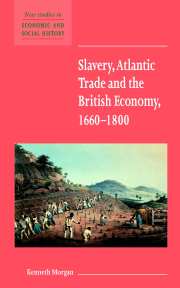Book contents
- Frontmatter
- Contents
- List of maps
- List of tables
- Acknowledgements
- Introduction
- 1 The context
- 2 The debates
- 3 The profits of the slave trade
- 4 Slavery, Atlantic trade and capital accumulation
- 5 British exports and transatlantic markets
- 6 Business institutions and the British economy
- 7 Atlantic trade and British ports
- Conclusion
- Bibliography
- Index
- Cambridge Cultural Social Studies
3 - The profits of the slave trade
Published online by Cambridge University Press: 05 June 2012
- Frontmatter
- Contents
- List of maps
- List of tables
- Acknowledgements
- Introduction
- 1 The context
- 2 The debates
- 3 The profits of the slave trade
- 4 Slavery, Atlantic trade and capital accumulation
- 5 British exports and transatlantic markets
- 6 Business institutions and the British economy
- 7 Atlantic trade and British ports
- Conclusion
- Bibliography
- Index
- Cambridge Cultural Social Studies
Summary
The British slave trade flourished mainly from the restoration of the Stuart monarchy until it was abolished by parliamentary act by the ‘Ministry of All the Talents’. During that period British slaving vessels dominated the Guinea traffic, delivering around half of all the slaves shipped from Africa to America. The trade escalated over time. Annual shipments of enslaved Africans increased about sixfold in the century after 1660 before levelling out or declining (D. Richardson, 1998: 441). The immorality of trading in human cargoes was widely recognised only after 1770, with the growth of an abolitionist movement based on Enlightenment values of rationality and progress in human endeavour, as part of which slavery and the slave trade appeared to be peculiarly retrogressive institutions. The spread of Christian benevolence, the belief in God's providence in a fallen world and the notion of progressive revelation in the second half of the eighteenth century also helped to promote an anti-slavery viewpoint (Anstey, 1975a: 91–235). The Quakers, Anglican evangelicals and Methodists who were prominent in the early anti-slave trade movement, as well as other enlightened observers, condemned the greed of slave merchants. For instance, the Revd Richard Watson, a prominent Methodist preacher, referred to Bristol as ‘a dark den of slave traders’; and a visitor to George Washington's Mount Vernon noted that slavery was allowed to flourish in North America because of ‘the greed of the Liverpool merchants who before the [American] Revolution peopled this Country with Blacks’ (K. Morgan, 1993a: 128; Budka, 1965: 105).
- Type
- Chapter
- Information
- Publisher: Cambridge University PressPrint publication year: 2001



